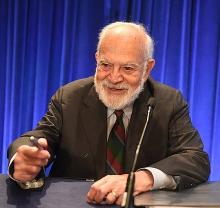What Is It
Everywhere we look -- in the media, in our political campaigns, in the hallowed halls of the academy -- we are confronted with an endless stream of BS, spin, propaganda, half-truths, and even outright lies. Yet for centuries, philosophers have argued that the pursuit of truth is both intrinsically good and instrumentally useful. But if truth is really both good and useful, then why is there so much BS around? John and Ken welcome Harry Frankfurt, author of On Bullshit and On Truth, to discuss the relative value and utility of Truth and its alternatives.
Listening Notes
John and Ken begin by questioning what the real relationship between truth and BS is in our society: If truth and its pursuit is so important, where does all the BS come from? And why does the public have such a thirst for falsehood and lies? John and Ken discuss how the differences between truth and BS are thought of in academia, but how BS seems to seep into even the highest levels of learning to some degree.
Ken introduces Harry Frankfurt, Professor Emeritus of Princeton University, and author of the recent popular philosophy books On Bullshit and On Truth. John asks Harry what exactly BS is, since it seems like Frankfurt owns the concept philosophically. Frankfurt discusses how in a somewhat paradoxical way people who lie are actually more attentive to the truth than people who think they are telling the truth, since the deceiver knows what he is lying about is false--his whole goal is to substitute truth for falsehood. Ken wonders about this possibility, since it seems odd to him that a liar honors the truth more than someone uttering what they think is true. Harry Frankfurt concedes that it is counter-intuitive, but supports this notion, because a liar really does emphasize the distinction between truth and BS when she lies.
John and Ken discuss some of Professor Frankfurt's influential contributions to philosophy, especially on the importance of truth. Frankfurt discusses the idea of 'caring' and how it relates to truth and BS. Additionally, the conversation turns to the selflessness of people concerned with truth, since personal preference should not play a role in what is true and what is false. Ken pounces on Frankfurt's claims on John's behalf, pointing out that while truth itself may not be altered by preferences, the choice to pursue certain truths and ignore others is definitely based on subjective and personal decisions.
John discusses the way societal circumstance and groups of peers can influence which truths seem important to pursue, and Harry Frankfurt and Ken discuss the different types of BS and some tell-tale signs that a claim is BS. Callers provide input about amusing BS stories and their own opinion about the distinction between truth and BS in everyday life, if there even is one!
- Roving Philosophical Report (Seek to 4:19): Novella Carpenter talks about truth and BS with people on the street as well as a trial lawyer and gets some surprising answers to her questions.
- 60-Second Philosopher (Seek to 49:47): Ian Shoales speeds through society's interest in liars and and con artists in a rapid effort to explain why it is we are so fascinated by deceit and the people who can get away with obscuring the truth.



